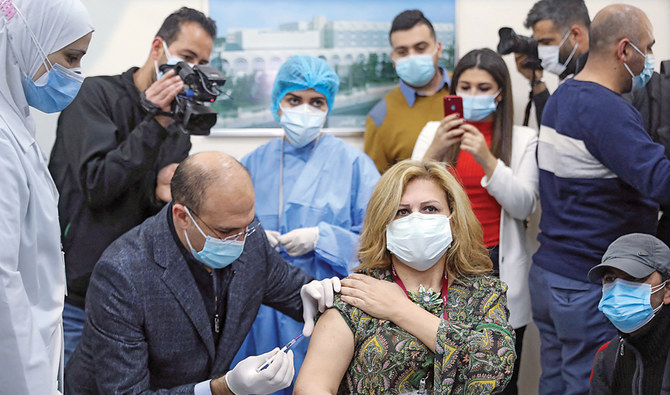BEIRUT: Lebanese health authorities on Saturday launched a COVID-19 vaccination “marathon” to speed up the country’s inoculation drive, with a day-long campaign offering the AstraZeneca shot at 30 different locations.
Long lines of people were seen in front of the vaccination centers and more than 7,800 were jabbed within seven hours.
Petra Khoury, who is the prime minister’s adviser for health affairs and heads the National Executive Vaccine Committee, called the turnout “joyful.”
Khoury said the committee would come up with new ideas in the coming weeks to reach people who did not know how to register on the vaccination platform and those who were generally fearful of the vaccine.
Around two dozen centers were offering jabs to people aged between 30 and 65 provided they were not suffering from any health issues or conditions that prevented them from receiving a shot.
The initiative also offered vaccinations to everyone who was registered on the vaccination platform but had yet to receive an appointment and those who were not registered on it, including those without identification papers.
Lebanon began vaccinating its population, including more than 1.5 million Palestinian and Syrian refugees, on Jan. 28 with the elderly and healthcare workers getting priority.
The country’s access to the AstraZeneca vaccine coincided with reports of deaths caused by strokes as a result of receiving this jab.
Many of those registered on the platform declined to take the vaccine while others, including the media and university professors, agreed to take it.
Nabil Rizkallah, a member of the National Executive Vaccine Committee, said that 64 percent of those who received the vaccine on Saturday were Lebanese and 36 percent were foreigners.
HIGHLIGHTS
• According to Health Ministry statistics, the total number of those who received the Pfizer vaccine as of Saturday was 559,789, while the number of those who received the AstraZeneca vaccine was 106,659. • The private sector has provided the Sputnik vaccine to more than 64,000 workers, including the self-employed, while 6,532 people have received the Sinopharm jab.
Rizkallah said: “The reason for the slowdown in vaccination and waiting in front of the centers was caused by confusion between registered and unregistered people, which led to long waits. But we will deal with the matter in the next marathon.”
The Ministry of Health allocated 15,000 vaccinations for the day, and medical staff waited until 6 p.m. for those wishing to be vaccinated.
Health Minister Hamad Hassan got his jab live on air at a center in Baalbek to nudge people toward the AstraZeneca shot.
“Lebanese society is educated and does not accept rumors, and the Ministry of Health is the right reference for information,” he said, adding that 100,000 people had received the AstraZeneca jab.
He offered reassurances about the safety and efficiency of this vaccine and said he got it to encourage others and because he was “convinced” that it provided the desired immunity.
He also said the Pfizer-BioNTech, Sputnik V and Sinopharm vaccines were effective and safe and that the ministry adhered to World Health Organization standards in the introduction of any vaccine.
Hassan confirmed that the marathon would be repeated every week and called on people of all nationalities to receive this vaccine.
Akkar in the north witnessed the lowest turnout, while centers in Mount Lebanon witnessed the highest.
Dr. Abdul Rahman Bizri, who is the head of the national vaccination campaign at the ministry, expected more than 1 million Pfizer doses to arrive during June.
This arrival would raise the immunization rate during the summer to 30 percent so that Lebanon could gradually move to the stage of social immunity, he said.
According to ministry statistics, the total number of those who received the Pfizer vaccine as of Saturday was 559,789, while the number of those who received the AstraZeneca vaccine was 106,659.
The private sector has provided the Sputnik vaccine to more than 64,000 workers, including the self-employed, while 6,532 people have received the Sinopharm jab.















